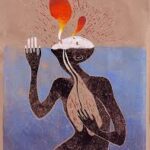The Breath of Metal

Cobi Swanepoel
In Traditional Chinese Medicine the Lungs are associated with the Metal Element, and it houses the Corporeal Soul (Po).
Metal is our ability to touch, communicate and feel, The Corporeal Soul is the direct manifestation of the Breath of Life
Grief is the emotion associated with the Metal Element and the Lungs.
On an emotional level the Corporeal Soul is directly affected by prolonged emotions of sadness or grief. Therefore, such emotions have a powerful and direct effect on breathing. The price paid for not expressing these emotions is often inner-deadness, a cut-offness or a melancholy depression.
Metal brings richness and quality to one’s inner life. If this function is weakened the person often experience no satisfaction in any situation- work, socially or in time spend alone.
Cynicism, boredom and apathy are consequences of being unable to let in and receive the richness of human experience.
Sometimes there is a desperate need for some sense of meaning in one’s existence. This may manifest as a search for a guru, father-figure, role-model who can reveal some form of wisdom. Sometimes it is more mundane such as being “successful”- driving a car, or being with a person who can “enhance” a sense of prestige- an attempt to compensate for the inner feeling that their lives lack fulfilment and purpose.
When someone’s relationship with their father /father figures has been problematic, the Metal Element can become afflicted. If the father was distant /more remote than the mother, there often is a sense of loss. If this feeling is very strong it can lead to imbalance.
Metal allows us to feel our emotions. It takes strength and wisdom to be honest about what we feel.
The Lungs are like “a Minister from whom policies are issued” and they work directly under the control of the Heart, the Emperor. The Lungs govern the Breath and provide inspiration and a sense of meaning to one’s life.
The Lungs are treated when there’s asthma, emphysema, bronchitis or other lung problems. The Lungs also largely govern the condition of the skin. The link between skin and lung problems is well known (ex: it is common to see children develop asthma if they use suppressive treatments such as hydrocortisone cream for eczema.)
The lungs play a crucial role in the regulation of fluids in the body and when they malfunction, dry or wet skin, oedema, abnormal perspiration or excessive phlegm are frequently the result
When we lose someone, we go through a process of grief, mourning and letting go.
If we never fully grieve, we stay stuck in the awareness of what we have lost and we stay sad and remorseful. The boundaries between us and the present will grow and we will become out of reach to others. Such a person cannot “accept” and “let go”.
Metal teaches reverence and respect for our bodies; it is our communication with ourselves and our God.
The Large Intestine is linked to the Lungs and is responsible for the elimination of waste from the body. Constipation, diarrhoea, lower abdominal pain and flatulence are common when this Official becomes imbalanced. It also discharges waste material through the skin. Spots, blocked pores and greasy skin can result if imbalanced. Throat and nose problems such as excessive mucus, sinus and impaired sense of smell may arise.
Negative emotions-Metal Element out of Balance: Grief, over-reactive, cowardly, deceitful, sad, depressed, petty, jealous, resentful. We lose touch with ourselves and others. We lose the ability to know our feelings and don’t care about the feelings of others. Inadequacy, guilt, regret
Positive emotions – Metal Element in Balance: relationships, sensitive, honest, firm, proud, loyal, refined. We are in touch with ourselves and others. We sense how others feel and have the courage to own our own feelings. Internal trust is what comes after grief- The recognition of what we still have and the decision to move forward with it.
Metal Symptoms: Skin problems, elimination problems, breathing problems
Our animal companions also experience grief. Grant them the space and respect for that to happen. Just because they don’t shed tears and have red faces and snotty noses from crying doesn’t mean they don’t feel. Learn from our friends – they feel and then they let go. They don’t deny themselves the grief, nor do they deny themselves a life after experiencing loss.
The Huainanzi says:” Instead of bringing joy from inside to outside we have tried to bring rejoicing from outside to inside. The music rings out and we are full of joy but when the tune ends, we are distressed”
